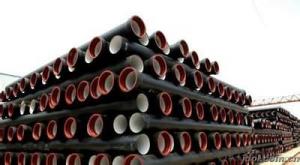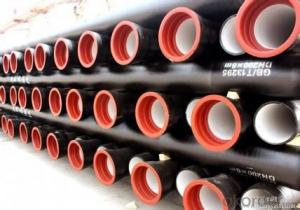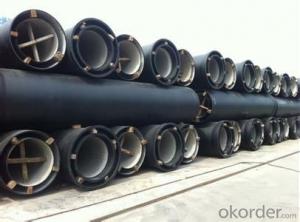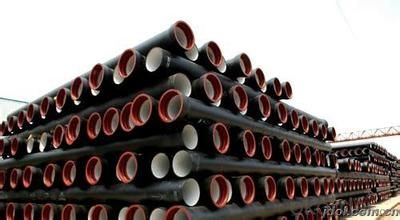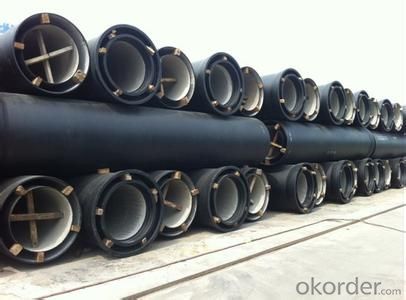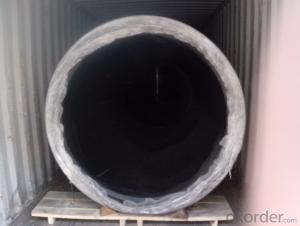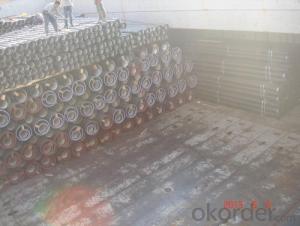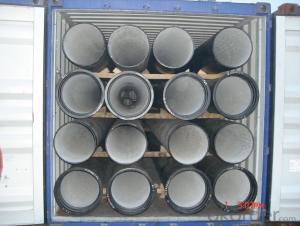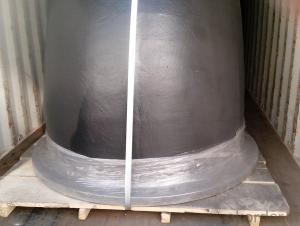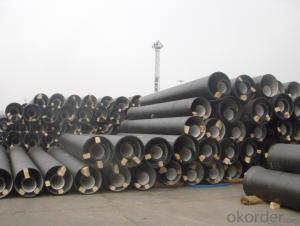DUCTILE IRON PIPE C Class DN1200
- Loading Port:
- China Main Port
- Payment Terms:
- TT OR LC
- Min Order Qty:
- -
- Supply Capability:
- -
OKorder Service Pledge
OKorder Financial Service
You Might Also Like
Ductile Iron Cast Pipe is without any defects compare with tradition casting tech, which has many advantages particularly as follow:
(1) High density. In the "vertical upward casting" process, the melt iron of centre liquid column in center crystallizer is continuously feeding for volume shrinkage caused by condensation tube at outer circumference , which lead to be free of shrinkage porosity.
(2) High purity. When melt iron pouring, the mixed impurities such as gas, dross, sand grain which are lighter than melt iron could be eliminated at furnace mouth, its impossible to enter into the crystallizer through the channel, so the melt iron into the crystallizer is very pure.
(3) Strength with toughness. The cooling speed provided by continuous crystallizer is 30 times than sand casting and 5 times than centrifugal casting, and doesn't produce white iron, the eutectic cell volume of continuous cast iron is one eighth to one tenth compare with traditional cast iron. The density of graphite nodule in ductile iron can reach 300-700 pcs/mm2. Therefore, all reason above improve the strength and toughness of continuous cast iron.
(4) Free machining. The high speed cooling make the hardening phase (such as boride, steadite) not appear like reticular, massive or thick, but diffuse like fish bone and pane in shape, moreover, there are tiny graphite flakes inlaid hardening phase. It's free machining in BrinellHardness the range of 250-300HB. However, the Brinell Hardness of 250 is top limit to common metal materials.
(5) Uniform composition of tube wall. The convection mixing of liquid column caused by marching type drawing in crystallizer make the composition of tube wall well-distributed, and concentration gradient very little.
(6) High productivity. To the wall thickness of tube under 10mm, the speed of continuous casting is 1 meter/min, to the wall thickness of tube under 20mm, the speed of continuous casting is 0.5 meter/min, which is high efficiency that centrifugal or other casting tech couldn't reach.
- Q: What are the typical applications for ductile iron pipes?
- Ductile iron pipes are commonly used for a variety of applications including water and sewage transportation, irrigation systems, fire protection systems, and industrial processes. They are also suitable for underground and aboveground installations due to their durability, corrosion resistance, and ability to handle high pressure and heavy loads.
- Q: Can ductile iron pipes be used for trench crossings?
- Indeed, trench crossings can utilize ductile iron pipes. Renowned for their remarkable strength and durability, ductile iron pipes prove to be fitting for a diverse array of purposes, including trench crossings. Their capacity to endure substantial burdens and external pressures renders them an optimal selection for subterranean installations. Moreover, ductile iron pipes boast exceptional resistance to corrosion, guaranteeing their enduring and dependable performance in the context of trench crossings.
- Q: Can ductile iron pipe be used for underground storage tank systems?
- Certainly, underground storage tank systems can utilize ductile iron pipe. Renowned for its robustness and potency, ductile iron pipe proves itself adaptable for diverse purposes, including underground storage tanks. Its exceptional tensile strength and immunity to corrosion render it a superb selection for confining and conveying liquids or gases in subterranean settings. Furthermore, ductile iron pipe exhibits remarkable resistance to external pressures and endures substantial burdens, establishing it as a dependable choice for underground storage tank systems.
- Q: Can ductile iron pipes be used in areas with high groundwater levels?
- Yes, ductile iron pipes can be used in areas with high groundwater levels. Ductile iron pipes are known for their durability and strength, making them suitable for various underground applications, including areas with high water tables. They have a robust construction that can withstand external pressures and corrosive environments, making them an excellent choice for water and wastewater systems in such areas.
- Q: What is the ductile cast iron pipe
- Should not have this conceptI make the ductile iron pipe, haven't heard of this thing only ductile iron pipe, ductile cast iron heard tube
- Q: What is the typical weight of ductile iron pipe?
- The typical weight of ductile iron pipe can vary depending on its diameter and wall thickness. However, as a general guideline, a 6-inch diameter ductile iron pipe with a wall thickness of 0.25 inches may weigh around 35 pounds per linear foot. Similarly, a 12-inch diameter ductile iron pipe with a wall thickness of 0.375 inches could weigh approximately 115 pounds per linear foot. It is important to note that these weight estimates are approximate and may vary slightly depending on the specific manufacturer and product specifications.
- Q: Luo what effect of ductile cast iron
- It should be chromium, chromium is anti graphitization elements in ductile iron if the content for a long time, will hinder the graphitization of cast iron, the iron cementite microstructure (Fe3C) content increased, the chilling tendency of the cast iron increases, will make iron brittle, hard, affect the mechanical properties and processing properties of nodular cast iron.
- Q: Can ductile iron pipes be used for underground wastewater outfalls?
- Yes, ductile iron pipes can be used for underground wastewater outfalls. Ductile iron pipes are a popular choice for underground applications due to their durability, strength, and corrosion resistance. They are designed to withstand high pressure and external loading, making them suitable for transporting wastewater over long distances and depths. Additionally, ductile iron pipes have a smooth internal surface, which helps to minimize friction and prevent the buildup of sediments or debris that could potentially block the flow of wastewater. Therefore, ductile iron pipes are commonly used in underground wastewater systems, including outfalls, to ensure efficient and reliable wastewater transport while minimizing the risk of pipe failure or blockages.
- Q: Are ductile iron pipes compatible with other pipe materials?
- Generally, other pipe materials can be compatible with ductile iron pipes. The high level of flexibility and strength of ductile iron pipes allows for their connection with various materials like PVC, HDPE, and steel. Transition fittings are often utilized to securely and prevent leaks when connecting ductile iron pipes with other materials. To maintain the integrity of the pipeline system and ensure compatibility, it is crucial to follow industry standards and guidelines when joining different pipe materials.
- Q: Are ductile iron pipes suitable for water distribution networks?
- Yes, ductile iron pipes are suitable for water distribution networks. Ductile iron pipes have been widely used in water distribution systems for many years due to their numerous advantages. Firstly, ductile iron pipes have excellent durability and long lifespan. They are highly resistant to corrosion, which is extremely important for water pipes as they are constantly exposed to various chemicals and substances in the water. This resistance to corrosion ensures that the pipes maintain their structural integrity over time, reducing the need for frequent repairs or replacements. Additionally, ductile iron pipes have high strength and can withstand high pressure, making them ideal for water distribution networks. They can handle heavy loads and resist external forces such as soil movement or traffic loads, ensuring the safety and reliability of the water supply. Furthermore, ductile iron pipes have excellent hydraulic properties. They have smooth internal surfaces that minimize friction and pressure drop, allowing water to flow efficiently through the system. This helps to conserve energy and reduce pumping costs, making ductile iron pipes a cost-effective choice for water distribution networks. Moreover, ductile iron pipes are versatile and can be easily installed in various soil conditions. They can withstand ground movement and settle without breaking, which is crucial for maintaining a stable water distribution system. In conclusion, ductile iron pipes are highly suitable for water distribution networks due to their durability, resistance to corrosion, high strength, excellent hydraulic properties, and versatility in installation. They provide a reliable and efficient solution for delivering safe and clean water to communities.
Send your message to us
DUCTILE IRON PIPE C Class DN1200
- Loading Port:
- China Main Port
- Payment Terms:
- TT OR LC
- Min Order Qty:
- -
- Supply Capability:
- -
OKorder Service Pledge
OKorder Financial Service
Similar products
Hot products
Hot Searches
Related keywords
